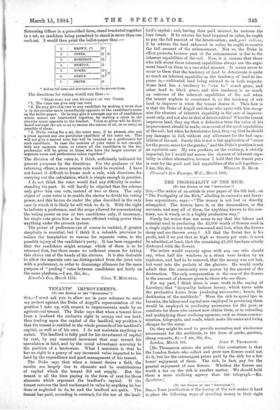TENANTS' IMPROVEMENTS.
To THE EDITOR OF THE "SPECTATOR."] SIR, I must ask you to allow me in your columns to enter my protest against the Duke of Argyll's representation of the position I take up, with respect to improvements made by an agricultural tenant. The Duke says that when a tenant hires from a landlord the exclusive right to occupy and use land, -thus trading upon the capital of the landlord, my position is that the tenant is entitled to the whole proceeds of his landlord's capital, as well as of his own. I do not maintain anything so unfair. The landlord is fully paid for his investment of capital by rent, by any unearned increment that may reward his Speculation in land, and by the social advantages accruing to -the position of a landowner. What I maintain is that he has no right to a penny of any increased value imparted to his land by the expenditure and good management of his tenant.
The Duke says that when a tenant drains a field, the results are largely due to elements and to contributions of capital which the tenant did not supply. But the tenant is all the time paying in the form of rent for those -elements which represent the landlord's capital. if the tenant restores the land unchanged in value by anything he has done or neglected to do, he and the landlord are quits. The tenant has paid, according to contract, for the use of the land- lord's capital ; and, having thus paid interest, be restores the loan intact. If be returns the land impaired in value, he ought to pay the full amount of the deterioration ; and, pari ratione, if he returns the laud enhanced in value, he ought to receive the fall amount of the enhancement. Not so, the Duke in effect protests, because part of the enhancement is due to the inherent capabilities of the soil. Now, it is curious that those who talk about these inherent capabilities always use the argu- ment based on them in a one-sided manner. It seems never to occur to them that the tendency of land to deteriorate is quite as much an inherent capability as the tendency of land to im- prove is,—cultivated land being referred to in both respects. Some land has a tendency to " run to " couch grass, and other land to black grass, and this tendency is as • much an outcome of the inherent capabilities of the soil when the tenant neglects to counteract it, as the tendency of wet land to improve is when the tenant drains it. Then how is it that the Duke of Argyll and those who agree with him recog- nise the element of inherent capability in the case of improve- ment only, and not also in that of deterioration P When the tenant improves land, they say that a deduction from the value of his improvement should be made, on account of the good capabilities of the soil ; but when he deteriorates land, they say that he should pay damages in full, without any allowance for the bad capa- bilities of the soil. Surely this is not a fair application of "sauce for the goose, sauce for the gander," and the Duke's position is not an equitable one. My own position, on the contrary, is strictly impartial, for I would not assess the element of inherent capa- bility in either alternative, because I hold that the tenant pays in rent for the good and bad capabilities of the soil together.— I am, Sir, &c.,WILLIAM E. BEAR.
Clement's Inn Passage, TEC., March 10th.


































 Previous page
Previous page